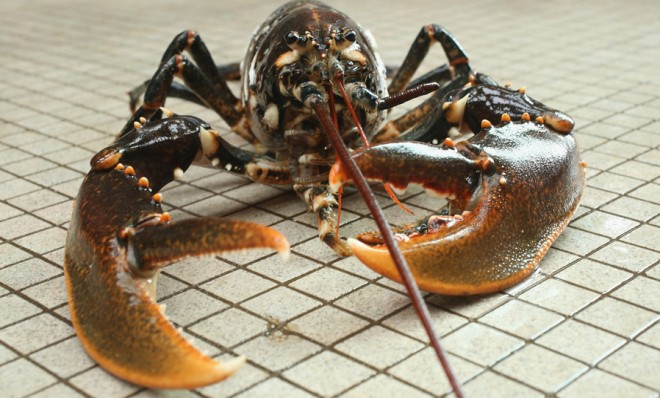Could lobsters help us live forever?
The tasty crustaceans are "biologically immortal," says biologist Simon Watt. Perhaps we can learn their secret.

A free daily email with the biggest news stories of the day – and the best features from TheWeek.com
You are now subscribed
Your newsletter sign-up was successful
While regularly gorging yourself on lobster flesh dripping in butter has the potential to shorten your life considerably, the crustacean's cells contain an enzyme that may hold the secret to eternal life.
Lobsters appear to be "biologically immortal," according to British biologist Simon Watt. The creatures are susceptible to disease, injury, and physical harm — as countless New England fisherman can confirm — but "unlike humans," says Watt, "they don't die as a result of their own metabolisms. There doesn't seem to be a built-in life expectancy in their cells."
Human cells continually replicate themselves, but can only do it a certain number of times before they die. As the cells die off, our bodies wither and age until we ourselves are dead. But lobsters are one of a select group of species that produce a large amount of an enzyme called telomerase, which rejuvenates cells and stops them from dying. When lobsters outgrow their shells, they simply grow new, harder shells — even as they reach 50 or 60 years of age. As a result elderly lobsters look as good as new, says Chris Gaylord at the Christan Science Monitor:
The Week
Escape your echo chamber. Get the facts behind the news, plus analysis from multiple perspectives.

Sign up for The Week's Free Newsletters
From our morning news briefing to a weekly Good News Newsletter, get the best of The Week delivered directly to your inbox.
From our morning news briefing to a weekly Good News Newsletter, get the best of The Week delivered directly to your inbox.
Ancient lobsters don't show any signs of aging. They do not slow down. They do not grow weaker. They do not become infertile. In fact, lobsters are actually more fertile in their old age. [Christian Science Monitor]
If we can successfully introduce a similar mechanism into human cells, there's the possibility that we could lengthen human lives indefinitely. Scientists at the University of Copenhagen have already mapped telomerase, the first step towards understanding what they call "the cellular fountain of youth." The project may soon help us develop cures for cancer — a disease which uses telomerase to replicate itself throughout the body.
But some scientists are skeptical about lobsters' ability to truly live forever. Lobsters may never stop growing, writes Marina Koren at Smithsonian Magazine, but that doesn't mean they never die. As lobsters get older, the energy required to shed their shells and recreate them anew has been observed to kill them. Between 10 and 15 percent die naturally "because the exertion proves to be too much," says Koren. And very elderly lobsters actually stop outgrowing their shells altogether — carting around old, worn-out shells that attract bacteria and begin to rot, eventually killing the creature off.
Others point out that if lobsters truly were immortal, the seas would likely be crawling with gigantic, centuries-old crustaceans that had grown into behemoths. In fact, the largest lobsters on record are between 30 and 40 pounds and thought to be no more than 100 years old. "A 'functionally immortal' animal that has a shorter recorded maximum lifespan than a human?" says invertebrate neuroethologist Zen Faulkes at his blog. "Color me unimpressed."
Immortality may not be such an attractive goal anyway. The planet would become overcrowded, and resources would quickly become scarce — we have problems funding Social Security and Medicare as it is. Besides, it would hardly be an end to mortal concerns, says David Derbyshire at The Daily Mail:
A free daily email with the biggest news stories of the day – and the best features from TheWeek.com
An extended life is not much use if that life is spent in suffering, either. Few people want eternal life, they really want eternal youth. And crucially, biological immortality doesn't mean you can't die — as the lobsters served in restaurants each day know all too well. [The Daily Mail]
Dan Stewart is a senior editor at The Week magazine. Originally from the U.K., he has been living in the United States since 2009.